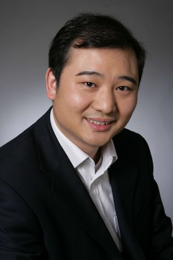
Footprints at Tsinghua
In 2001, YANG Cheng quit his job at the Sports Market Management Section of the Beijing Municipal Bureau of Sports, and decided to pursue a long-expected IMBA degree at Tsinghua SEM. During the two-year program, he left two strings of footprints, deep and shallow, on Tsinghua’s campus. One reflects his study at Tsinghua SEM, and the other his persistence in jogging and cultivation of sports hobbies. Actually, it is these two paths, complimenting and supporting each other, that enabled him to achieve his career today.
YANG Cheng very much values Tsinghua’s pragmatic spirit, which is mainly exemplified by its emphasis on practice and details. The love for sports assists YANG Cheng to find the direction of career. Meanwhile, the pragmatic study at Tsinghua SEM enables him to blaze a trail in the undertaking. Now, he is making each of his steps more accurate and forceful.
From Formula Car to the Bird’s Nest
In 2005, YANG Cheng made his first try in sports industry operation and targeted the Formula car race that had just entered the Chinese public’s sight. After an initial investigation, he thought it would be difficult to operate the race in Beijing. The market was not mature enough—the target audience was small, the infrastructure facility was insufficient, and the building investment would be extremely large. In 2008, he began to work in Beijing National Tennis Center Co. Ltd. and was responsible for its operations. He got first-hand experience about sports venue facilities, training, and the promotion and operation of competition events, which laid the foundation for his later work in the Bird’s Nest.
After the 2008 Olympic Games YANG Cheng was assigned as Vice General Manager of National Stadium Co., Ltd. He took charge of the strategic research and development as well as market development for the Bird’s Nest, the national symbol and brand, giving advice and suggestions on exploring its future growth. From studying the Formula car race to conducting strategic research and development for the Bird’s Nest, YANG Cheng was constantly exploring new opportunities and challenges.
A Preliminary Exploration of the Transformation of the Olympic Venue
The halo around the Bird’s Nest is a “double-edged sword”, YANG Cheng admits. On the one hand, it possesses the brand value and influence that no other sports venue can surpass. On the other hand, it is also burdened with its fame. To achieve transformation and sustainable profit of Olympic venues, and to combine economics and public welfare within those venues, is YANG Cheng's relentless pursuit and dream.
"As there is no successful precedent in the world yet, I am now the pathfinder in this field." he says with a smile. Traditionally, there are two models for the redevelopment of Olympic venues. First is the redevelopment of professional venues, such as basketball and tennis courts, which usually become venues for professional tournaments. Second is the redevelopment of comprehensive venues, such as the Bird's Nest—where the opening and closing ceremonies of Olympic Games were held—which combines sports games, cultural shows and leisure activities, but mainly focusing on sports activities and spirit.
Speaking of the future development of the Bird’s Nest, YANG Cheng described three directions. The first is to hold high-level ceremonial sports events and cultural performances, such as the 2015 World Athletics Championships and International Football Tournament, making the Bird’s Nest as the permanent top venue for China’s big events and helping the fame of its brand last forever. The second is to hold interactive public activities that focus more on real market demand, compared with big events with high investment but small audiences. For example, the annual winter skiing programs, Adili’s tightrope walking, and programs for children, are all well attended activities, which not only spread sports value and spirit but also make constant profits. The third is to build and manage the brand of the Bird’s Nest, for example, through finding new partnerships, developing franchised products, and promoting the animation industry, in order to increase the value of its intangible assets.
All these flashes of thinking and thoughts about future development reflect YANG Cheng’s vision for the long-term management of the Bird’s Nest. He prefers to be an explorer than a manager, as he loves to blaze new trails for progress in the thorns and to create a precedent out of nothing. The Bird’s Nest is the fruit of Chinese and global wisdom and innovation. His days on Tsinghua campus bestowed on him the direction and strength and his spirit of exploration and innovation which will lead him even further in opening up the prospects of China’s sports industry. We wish an even brighter future for the Bird’s Nest and YANG Cheng.